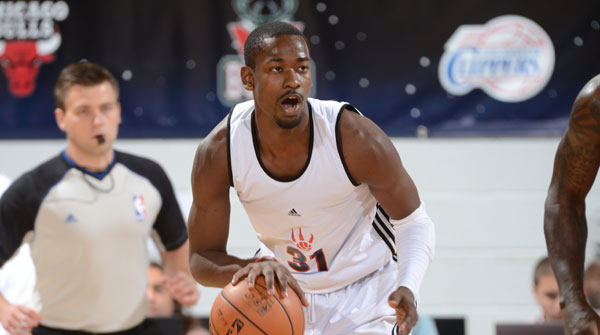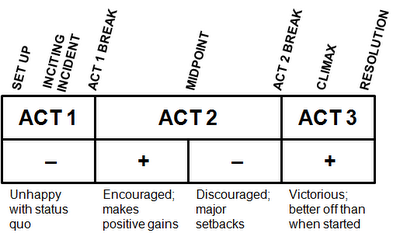Warning: This is another one of my epic columns, but try and stick with it because it gets into some never discussed territory (that I know of), and talks specifically about the Raptors’ situation.
With the 2014 draft looking like it might get even better, and with many scouts and NBA executives saying there could be multiple franchise players and as many as eight All Stars, there has been A LOT of discussion about tanking. And a lot of debate.
Sometimes passionate debate.
There is a portion of NBA fans who find the idea of tanking repulsive. Teams SHOULDN’T tank because it’s not competitive or is somehow a blight on a franchise. Basically, the idea is that teams shouldn’t tank because it’s not the “right” thing to do.
Of course, there are no titles for teams that do the “right” thing. The only title up for grabs in the NBA is the one you get by winning 24 16 games in the playoffs. Lots of people thought what Miami did, when they added LeBron James and Chris Bosh to play with Dwyane Wade, was rather duplicitous but it resulted in two titles.
Now, despite my well known defense of it, I am not a fan of tanking in itself but I am also aware of the realities of the league. And the realities are that teams are not on a level playing field. There are certain teams that have an historical advantage (Lakers, Boston), other teams that have a geographical advantage (Miami, New York, Clippers) and some that have a mixture of the two (Houston). The reality is that if you own one of those teams, you have a distinct advantage over every other team.
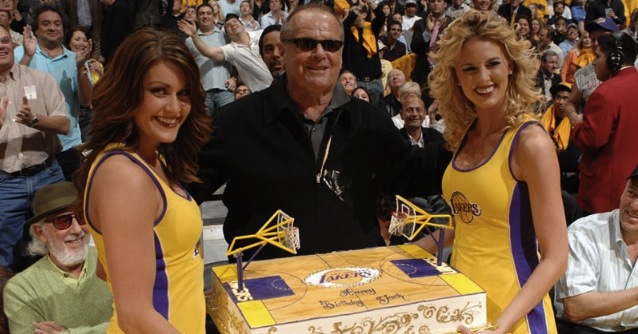
Those prime destination NBA cities can generally attract the best free agents and you usually know star players aren’t going to refuse trades there, and will often demand trades to one of them.
So the other cities have to figure out ways to compete with that advantage. Some teams try and outspend everyone else, but that becomes much more difficult, and costly, with the new CBA. And it was never a very sound strategy to begin with. The Spurs have been able to simply draft better than everyone else, but finding elite players outside of the top five in the lottery has become nearly impossible with better international scouting and the NBA’s rule against drafting high school players.
In fact, in the last ten years, there have been 11 players drafted outside of the top 5 that have become All Stars, with just 6 of those making an All NBA team. Conversely, in the last ten years, there have been 18 players drafted in the top 5 that have become All Stars, 16 of whom made an All NBA team. Those are rather overwhelming statistics. Especially when you consider that the pool of talent in the top five picks is so much smaller. Basically, if you have selected a player in the top five, in the last ten years, there’s a 32% chance that player has become an All NBA player by now.
It’s impossible to argue that your odds of finding an elite player doesn’t drop dramatically outside of the top five spots.
Why do you need an elite player? Well, because if you truly want to build a contending team, then you’re going to need, at least, one elite player, if not two.
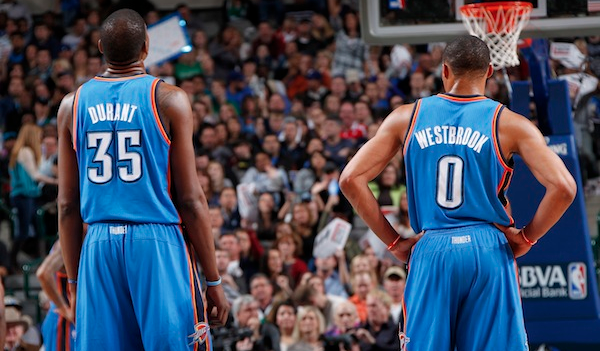
In the history of the league, there has only been one Championship team that did NOT feature at least one All NBA player, the 2003-04 Detroit Pistons. But that stat is misleading because Chauncey Billups did end up making an All NBA second team and two All NBA third teams and Ben Wallace made an All NBA third team and won four Defensive Player of the Year awards.
So how do these non-prime NBA destination teams acquire these elite players?
Well, it might surprise many to learn that the vast majority of elite players were acquired by their teams through the draft (of the last 300 All NBA selections, 65.3% were acquired via the draft). And if teams didn’t draft an elite player directly, chances are they turned a high draft pick into one.
Now, for fans who believe that their teams can sign or trade for one, unless you’re a fan of a team in Los Angeles, New York, Miami, or one of the other prime NBA destination cities, then I’ve got some very bad news. If you think the lottery is a pipe dream, wait until you hear about the odds of acquiring an All NBA player outside of the draft. Especially if you don’t already have one in order to get them to agree to come.
In the last five years, there were eleven All NBA players that changed teams. Only three of those players didn’t have a say in where they went, and only one went to a city other than one of the aforementioned prime NBA destination cities, and that was Andrew Bynum going to Philadelphia. Bynum didn’t play one minute for Philadelphia, ended up signing elsewhere, and now Philadelphia has decided to tank for the 2014 draft.
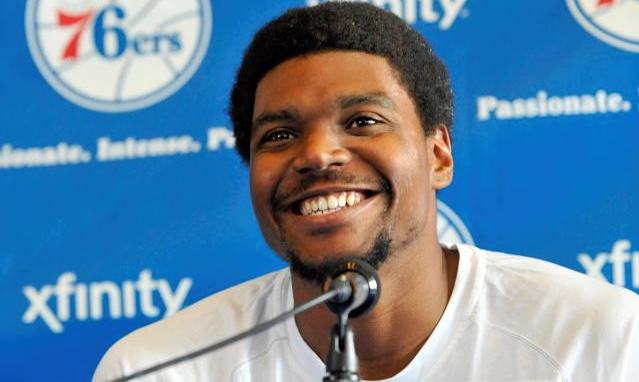
There simply aren’t a whole lot of examples of non-prime NBA destination teams being able to successful sign or trade for an elite player, especially if they don’t already have one on the roster.
So, this is where tanking comes in.
In most years, tanking is a big risk because even if you end up with the worst record, you’ve only got a 25% chance of landing the top pick. As I mentioned, the next draft is different. If you’re going to tank, next season is the time to do it.
Now, I’ve heard pretty much all the arguments against tanking.
Obviously it’s not in every team’s best interest to tank. For most playoff teams, gutting the roster and starting again simply isn’t feasible. And most owners wouldn’t allow that, anyway. The feeling is that the Milwaukee Bucks owner has directed management to continue to compete for a playoff spot.
There are also a number of lottery teams that already have their franchise player and surrounded him with some talent, so taking a step back isn’t worth it. Teams like Cleveland and Washington would fall under this category.
For the teams that are already bad and don’t have much talent, tanking is a no-brainer. Of course, for them it’s not tanking. It’s simply playing out the season.
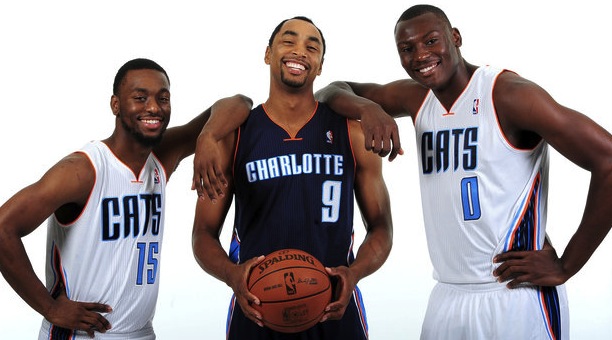
It’s the rest of the teams that have a decision to make. Those teams in in the 30s, wins-wise, and those who have been hovering around .500 for far too long. Is it worth tearing down what they have, even for a loaded draft?
Surprisingly, not as many teams look they’re tanking as many first thought there would be. In fact, I would say there are only two teams (Philadelphia and Utah) actively tanking and three others (Orlando, Phoenix and Charlotte) that don’t really need to tank to be bad. Now, that’s obviously not to say there will only be five lottery teams next season, but the rest of the teams do look like they will be making an effort to be a playoff team, even if their chance of being one is pretty slim.
Things could definitely change as the offseason progresses and after the season starts. If Boston does poorly after Rajon Rondo returns from injury, we could see him moved and Boston joining the rest of the tankers.
If Portland doesn’t, at least, look like they might be in the playoff hunt, I wouldn’t be surprised to see LaMarcus Aldridge on the market.
Obviously each situation is different, but here are a list of arguments that usually come up from those arguing against tanking.
THERE ARE NUMEROUS “STUDIES” DONE THAT PROVE TANKING DOESN’T WORK
The most common articles people point to are these three:
Wages of Wins: Tanking Used to Work in the NBA
The NBA Geek: Tanking Ain’t All That
While each article is well written and backed up by statistics, but all three make the fatal mistake of ignoring non-numerical evidence which completely taints the results of their research.
The main problem is that they assume that all NBA teams are on a level playing field, which is obviously not true. The Lakers have an unmistakable and very large advantage over a team like Utah both geographically and historically (the Lakers have 16 Championships compared to zero for the Jazz). In other words, it’s much easier for a team like the Lakers to stay successful because players WANT to play there. Kareem Abdul-Jabbar demanded to be traded to the Lakers. Shaquille O’Neal left a contender, in Orlando, to play for one of the leagues most storied franchise. Sixteen years later, the Lakers were one of only a few teams Dwight Howard would agree to be traded to.
No player has EVER demanded to play in Utah, and they’ve never been able to sign any free agent of note in their history.
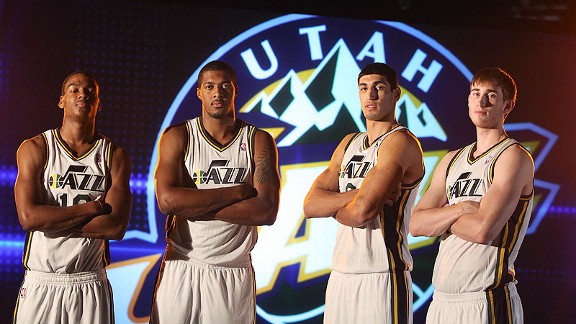
Another thing none of the articles take into consideration is the quality of management and ownership, two of the most important factors in the success of an organization. When Jerry West is your general manager for 20 years, and Jerry Buss is your owner over that same period, chances are you’re going to be successful for most of that time. If you’ve got Elgin Baylor as your GM and Donald Sterling as your owner, on the other hand, success is probably not going to be a long term state, no matter where you are located.
To say that the Lakers have stayed successful because they don’t tank is a rather rudimentary argument. The Lakers tanking would make about as much sense as George Clooney using e-Harmony. It would be completely unnecessary.
And Minnesota hasn’t made the playoffs in nine years because David Kahn, the former general manager, made personnel moves like drafting three point guards in the first round, in 2009, trading, arguably, the best one (Ty Lawson) away for journeymen players, and bypassing Stephen Curry in favour of Jonny Flynn. And then in 2010 he drafted Wesley Johnson over DeMarcus Cousins, Greg Monroe and Paul George. And then traded a first round pick for an injured Martell Webster, and then tried to sue Portland for agreeing to the trade. Minnesota hasn’t stayed bad because they’ve been continually tanking. They’ve stayed bad because they can’t seem to do more than one good move in a row without following it by a monumental blunder.
TANKING DOESN’T GUARANTEE SUCCESS
I’m not quite sure why this argument continues to be brought up because I’ve never seen anyone, in a pro-tanking argument, make any contradictory claims.
Obviously tanking doesn’t guarantee anything, but not tanking doesn’t guarantee anything either. The point of tanking is not to guarantee anything, but to simply increase your odds. As I outlined earlier, there is overwhelming evidence to support the claim that your odds of finding an elite player increase dramatically if you draft in the top five. Tanking simply increases your odds of drafting in the top five.
Arguing that you shouldn’t tank because it doesn’t guarantee success is akin to arguing you shouldn’t go to university because it doesn’t guarantee a successful career. Just as going to university increases your odds of having a successful career, tanking increases your odds of acquiring an elite player.
WHAT IF THOSE PLAYERS DON’T PAN OUT LIKE EXPECTED BEFORE THE DRAFT?
Shabazz Muhammad is a name that seems to come up a lot, as well as Harrison Barnes. And while it’s true that chances are one or two of the expected draft of 2014 players might end up disappointing in college and dropping, for every Shabazz Muhammad there is a Victor Oladipo or Anthony Bennett, players who came out of nowhere to exceed expectations and ended up getting drafted first and second.
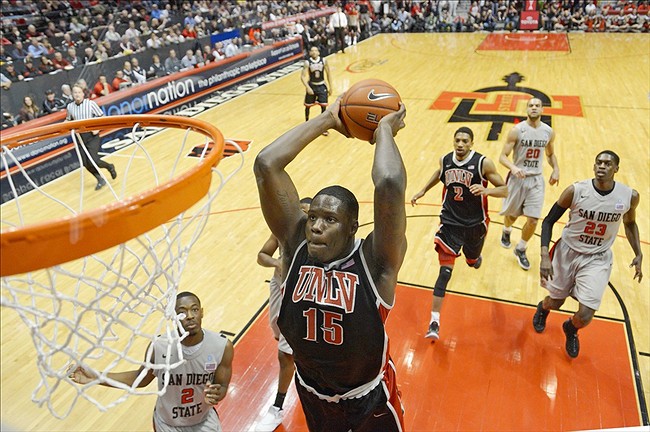
If you’re going to assume players disappoint, you also have to assume there might be some that surprise.
THE PLAYER THEY DRAFT COULD END UP BEING A BUST
Well, the odds of drafting a bust decreases the better GM and scouting a franchise has, so if you don’t have faith in your GM, then you probably don’t want him to tank. Although, if you don’t have faith in your GM, then no strategy is going to work.
When you look at the percentage of players who have been major disappointments who were drafted in the top five, it’s actually pretty low. And that’s looking at historical numbers, and not at specific drafts. Some drafts have a higher chance of having disappointing picks in the top than others.
Of course, the majority of busts, in the last ten years, seem to have been one dimensional or raw big men teams hoped would be able to make big developmental leaps. Tyrus Thomas, Hasheem Thabeet, Sheldon Williams, Darko Milicic and even Thomas Robinson would fall under this category.
The other major category for busts would be tweener scorers who aren’t big enough to play PF in the NBA and aren’t quick enough to play SF. These guys would be Adam Morrison, Michael Beasley and, so far, Derrick Williams (Anthony Bennett should be slightly worried).
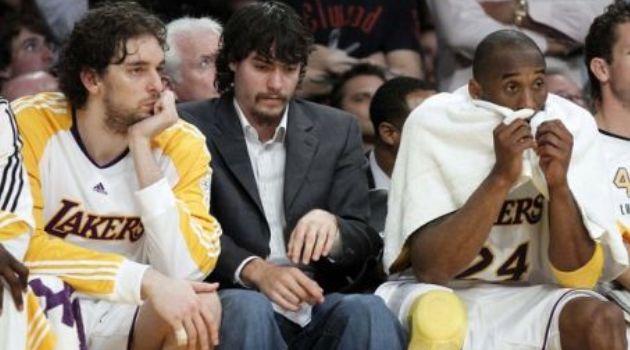
If you’re a fan of a team that is going to tank, I would contact the GM and relay this information to him.
TEAMS NEED TO WIN TO ATTRACT FREE AGENTS
Winning doesn’t attract free agents, otherwise San Antonio wouldn’t have had to build through the draft. And do you care to guess who currently has the second most consecutive trips to the playoffs after San Antonio?
It will probably be a surprise.
Denver has been to the playoffs for ten consecutive years, yet haven’t been able to attract one impactful free agent.
Atlanta wasn’t able to land a better player than Paul Millsap (no offense to him) after six consecutive years in the lottery playoffs and a ton of cap space this summer.
Winning certainly doesn’t hurt, but top free agents generally want to play in a prime NBA destination AND play on a contender. If you are a prime NBA destination and/or already are a contender, I wouldn’t recommend tanking.
THEY HAVE A BETTER CHANCE TRYING TO TRADE FOR AN ELITE PLAYER
Again, history isn’t on your side in this argument, unless you are a prime NBA destination. The reason is that elite players generally don’t become available, and if they do, there’s usually a reason. It could be that they are nearing the end of their contract and have lost faith in management to build a winner around them. In this case, they usually have a list of teams they would agree to a trade to. And that list usually involves the usual suspects. You could trade for him, anyway, and hope he re-signs, but you’d be giving up a hell of a lot on a gamble.
Unlike trading your current players for picks and prospects, trading for an elite player puts all your eggs in one basket and if he doesn’t re-sign, it could hurt the short and long term prospects of the team. If Deron Williams hadn’t agreed to re-sign with the Nets, that would have meant they would have traded Derrick Favors and Enes Kanter, two excellent big man prospects, for nothing AND they would still owe Utah a draft pick, one that the Nets would then desperately have needed.
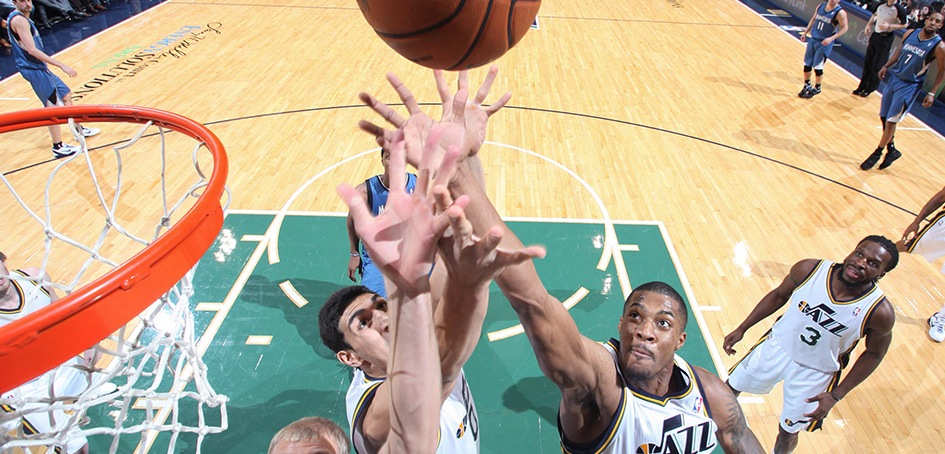
Of course, there is also the danger of trading for an Andrew Bynum, who was available simply because he was an injury risk. And the Lakers gave up Bynum to get Howard and then watched him walk away for nothing.
Obviously, people like to point to the James Harden example, but the circumstances of that trade are virtually unrepeatable, so banking on something like that becoming available seems, well, overly optimistic.
CREATING A WINNING CULTURE IS MORE IMPORTANT
I remember people using the same excuse of why the Raptors should win the last few games of the 2012 season despite being mathematically eliminated from the playoffs in October. Keep in mind that even one fewer win that season would have resulted in the Raptors selecting 8th, instead of 9th and having Harrison Barnes being available.
A winning culture is definitely important, but it’s a lot easier to create a winning culture with elite talent.
IF YOU TANK THE PLAYER WILL JUST END UP LEAVING
Players don’t leave teams because they tanked to get them. LeBron James, Carmelo Anthony, Chris Bosh, Chris Paul and Dwight Howard all left or demanded to be traded because they had lost faith in management. And in most cases, that lost faith was justified.
Besides, if you’re too worried about losing your elite player that you draft, then there’s no point in acquiring one by any means.
NO TEAMS THAT HAVE TANKED HAVE WON A TITLE
There are a few problems with this statement.
The first is that in the 66 years the NBA has been in existence, only 18 different teams have won titles. The Celtics have won 17 of them and the Lakers 16 of them. Chicago is third, and they won all six of their titles when they had Michael Jordan. The sample size isn’t exactly big.
Boston actually DID tank the season before they won the title with Paul Pierce, Kevin Garnett and Ray Allen. They just didn’t get the player they wanted. They ended up getting the fifth pick (Jeff Green) and trading him to Seattle for Allen, who was enough to make Garnett agree to a trade from Minnesota.
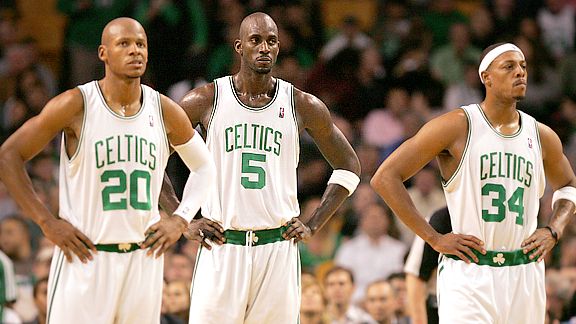
The biggest problem, though is that tanking actually isn’t a strategy to build a Championship team. It’s simply a strategy to acquire an elite player. The strategy to build a Championship contender comes AFTER you acquire the elite player.
Both Cleveland and Denver tanked to get LeBron James and Carmelo Anthony, but it was their failure in building after they drafted them that was the problem. Danny Ferry surrounded LeBron with mediocre players and over-the-hill veterans, yet they were still able to reach the finals despite that. The team record after LeBron left is probably the best indication of how little talent LeBron had around him. Conversely, when Michael Jordan retired the first time, his supporting cast was so strong they were able to get the Bulls back to the second round and win 55 games.
So, ultimately, the argument that no teams that have tanked have won a title is neither correct nor even valid.
I WANT TO WATCH THE RAPTORS IN THE PLAYOFFS
This is the point where I focus on the Raptors.
There are quite a number of Raptors fans who are sick of losing and want to watch them in the playoffs, so are completely against tanking.
Without getting into the whole argument of whether the current team even has the potential to be anything more than just first round fodder for the foreseeable future, the more pressing question is whether this is even a playoff team.
Hoopsworld recently projected them to come in twelfth in the East, and there’s not a whole lot of reason to completely disagree with that projection. They won just 34 games last season and haven’t made any offseason additions that should really make much of an impact in the win column. Personally, I would guess 10th, with about 40 wins (I predicted 10th place in the East and 35 wins last season), but neither of us predict the playoffs in the Raptors’ near future.
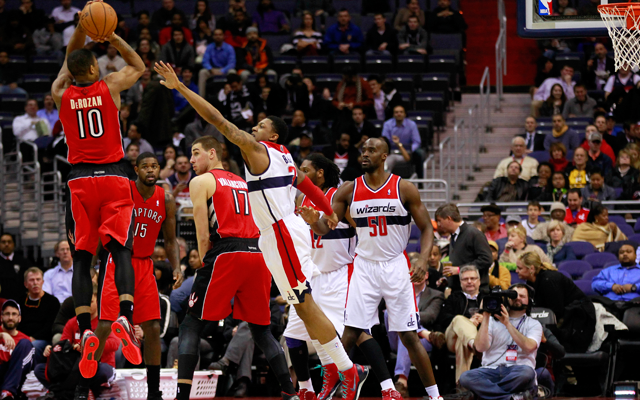
You could point to the 8-1 finish to the season the Raptors had, as a reason to be optimistic about next season, or the fact that Jonas Valanciunas, Amir Johnson, Rudy Gay, DeMar DeRozan and Kyle Lowry was the fifth best lineup, in terms of point differential, with a minimum of 240 minutes played.
The problem, though, is that the 8-1 finish was a mirage, as anyone who has watched the NBA for more than a couple of years, will know. First, there is the whole issue of the Raptors going up against teams that had basically given up on the regular season (which should have been obvious to anyone who watched the games). Plus, DeRozan shot over 60% in four of those games and shot 57% in the last eight games, including 60% from the three point line. Rudy Gay shot 54% from three after shooting 29% for the rest of the season. And then there was this…
RT @mySynergySports: Over last 15 games, Jonas Valanciunas is scoring 1.203 points per-possession, which would rank first in NBA this season
— Ryan Wolstat (@WolstatSun) April 6, 2013
What I’m trying to say is how these players ended the season was an aberration and not even remotely sustainable. If you think these numbers are just a sign of things to come, for these players, let me just add the fact that Amir Johnson went 3 for 5 from the three point line during that period.
Of course, fans often forget that their team doesn’t exist in a vacuum. Obviously Miami, Indiana and Chicago are all probably locks to win, at least, 50 games. There may be some question about how Brooklyn can do, but does anyone really think they won’t finish above Toronto?
I’ve never thought much of the Knicks, but they won 54 games last year and there’s no reason to believe they won’t do much worse than that.
Atlanta basically replaced Josh Smith with Paul Millsap (and Elton Brand), and Lou Williams should be healthy, so perennial All Star Al Horford should lead the Hawks to a similar record as last year and make the playoffs for the 7th consecutive year.
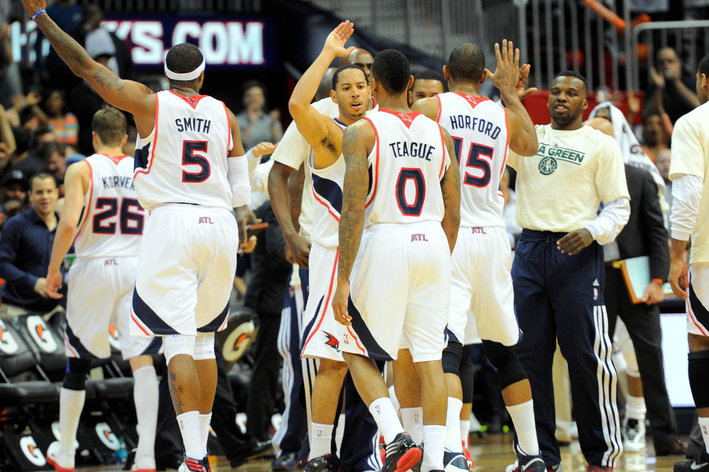
That’s six teams that should definitely finish above the Raptors.
And then there are the Pistons, who added Josh Smith and Chauncey Billups and, after underperforming last year, should make a big jump in the standings. They are desperate to make the playoffs next season, after giving up their draft pick, and I wouldn’t be surprised to see them win, at least, 45 wins next year.
Cleveland added Andrew Bynum and Anthony Bennett, but a healthy season from Anderson Varejao and Kyie Irving should put Cleveland among the most improved for the season.
The Wizards were 24-25 with John Wall in the lineup, last season, so they should be another team that ends up being much better, especially considering they were wracked by key injuries (and not fortunate ones, like for Toronto with Andrea Bargnani). I wouldn’t be surprised to see Washington ahead of Toronto in the standings.
And then there are the Bucks, who reloaded and should again be in the fight for a playoff spot next season.
So basically, you’ve likely got two open playoffs spots and five teams, including the Raptors, fighting for them. While the Raptors could definitely be one of the teams that sneak in there, I definitely wouldn’t say they would be a favourite to do it.
If the Raptors miss the playoffs AGAIN, not only has the team missed a chance to make a run at probably the best draft in a decade (missing the playoffs and drafting 14th would not be the same as drafting 3rd), you’re now looking at a team that could end up losing two key assets for nothing OR overpaying them to remain on a team that didn’t even make the playoffs.
Which brings us to the next, and last, part…
THE RAPTORS AREN’T IN A POSITION TO TANK
There are a lot of fans that will argue that the Raptors simply aren’t in a position to tank. They have too much talented with contracts that are too difficult to move.
There are actually four very good reasons now is the best time to tank, and that doesn’t even include how strong the draft is.
The first is that Jonas Valanciunas is just coming off his rookie season, and the Raptors have him under contract for another four, so still have plenty of time to rebuild the roster enough to entice him to re-sign.
The second is that DeMar DeRozan still has the “potential” tag, which means his value is probably higher than his actual production, despite his contract. Ujiri would be wise to sell high with DeRozan, something Colangelo failed to do with Bargnani (and Bosh).
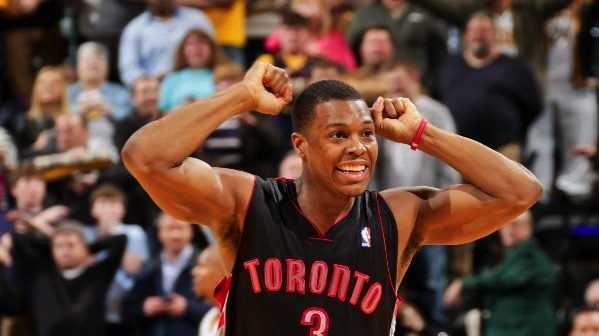
The third is that Kyle Lowry is coming into the final year of his current contract, which probably explains him currently being in the best shape of his career. If history has shown anything, it’s to be weary of players like Lowry going into contract years. If he does have a career year, he’ll go into the offseason at the worst possible time for the Raptors. It’s likely he’ll demand (and probably get) $10 million+ a season, a steep price to pay for a mercurial player who has never lived up to his promise. Especially if the Raptors don’t even make the playoffs.
It’s the perfect time to trade Lowry, either before the season starts or after a month or so, in order to maximize his value. Otherwise you risk having to overpay him to keep him or lose him for nothing.
Lastly, there is Rudy Gay. Much has been written about how bad his contract is, but I think it’s unfair to say it’s immoveable. If Bargnani can be traded for something other than another bad contract, it’s hard to believe Ujiri can’t get back something of value for Gay.
And for those who think there’s no way he would opt of the last year of his contract that would pay him more than $19 million, I give you a projected twenty two teams with at least $10 million in cap room, eighteen of whom will have at least $20 million in cap room. That’s absolutely unprecedented.
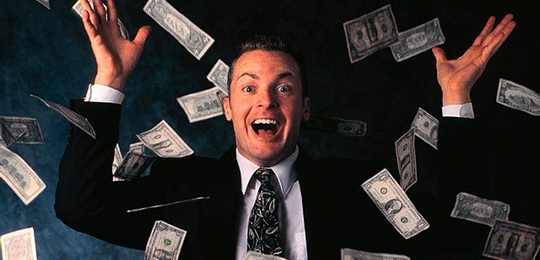
And keep in mind, the 2014 free agent class is not nearly as good as it might seem, so players like Gay would probably be able to clean up. Even if he doesn’t get $20 million, he still should be able to get a 4 year, $15 million a year contract, which would make it worth opting out. And considering that Gay might end up being one of the top two or three best unrestricted free agents under 30 years of age available, next summer, I find it hard to believe Gay wouldn’t opt out. Especially when you’ve got eighteen teams with enough cap room to offer a maximum contract, and not a whole lot of talent to choose from.
For those that think that letting Lowry and Gay go to open up cap room would be a better option, just remember there would be 21 other teams with cap room, so it’s likely cap room isn’t going to get you much next summer.
So it seems that this year is actually the perfect time for the Raptors to trade Gay, Lowry and Gay DeRozan for draft picks and prospects and tank for the season, because the alternative doesn’t seem like a better option.



